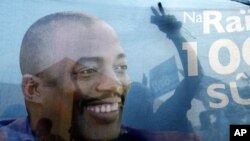In the Democratic Republic of Congo, President Joseph Kabila is rejecting suggestions that irregularities in last month's vote cast doubt on the legitimacy of his re-election. The leading opposition candidate is rejecting those results and has declared himself president.
President Kabila says there were clearly problems with a vote that stretched to a third day in some areas because of the late delivery of ballots. The electoral commission says results from nearly 2,000 polling stations in the capital were never recorded. But the president says there is no doubt he won.
"The credibility of these elections cannot be put in doubt. Were there mistakes, errors? Definitely," he said. "Definitely. Like in any other election - be it on the continent or otherwise. But does it put in doubt the credibility of the elections? I don't think so.”
Electoral observers from the U.S.-based Carter Center say vote results were “mismanaged,” compromising the integrity of totals that show longtime opposition leader Etienne Tshisekedi losing to President Kabila by more than three million votes.
“That doesn't mean, and we are not able to say at this point, whether that affects the finishing order of the candidates," said David Pottie, the associate director of the Carter Center democracy program. "But it does really call into question, and should call into question, the integrity of this results process writ large.”
Speaking to reporters at the presidential palace, Kabila said it is notable that no other election observers have backed up the Carter Center claims.
Asked about Tshisekedi rejecting the results, the president said they have not spoken since the vote.
"Well, I haven't talked to Mr. Tshisekedi," said Kabila. "I thought he was going to call me to really congratulate us on winning these election[s]. Unfortunately, that is not what he did.”
What Tshisekedi did is declare himself president. Kabila says that is no surprise as the opposition leader declared himself president even before the vote and declared himself prime minister in 1992 under the dictator Mobutu Sese Seko when this country was called Zaire.
"How effective was it back then in '92? He failed in '92," he said. "He definitely is going to fail now.”
Tshisekedi's party says Congo's Supreme Court does not have the independence to rule fairly on electoral challenges and is calling on supporters to mobilize this week to protest the results. President Kabila says Tshisekedi must follow the law like everyone else.
"We will call on him to respect the laws on this land, and in case he has any queries, any contradictions arising from the results of the elections, for him to make good use of our justice system,” added Kabila.
Tshisekedi is calling on the international community to step in to avoid what he says could be another bloodbath in Congo, which endured five years of bloody civil war beginning in the late 1990s. President Kabila says the country is calm and will remain so.
"The Congo is not in turmoil. There is no crisis in the Congo," he said. "There is no civil war in the Congo. If there was a civil war, I was going to be the first person to tell you we have a dangerous situation. It's not the case.”
Asked about his reaction to opposition calls for protests, President Kabila said his government is going to stay calm and continue with the day-to-day activities of the state. As of now, Kabila says, nothing will change.




